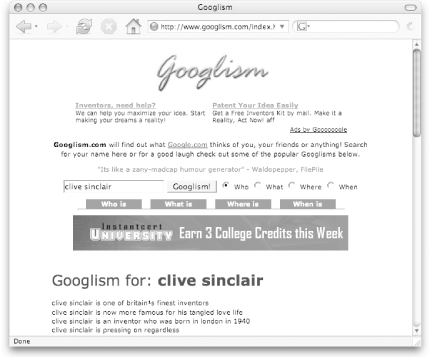|
|
< Day Day Up > |
|
Hack 69. Find Out What Google Thinks ___ Is
What does Google think of you, your friends, your neighborhood, or your favorite movie? If you've ever wondered what people think of your home town, your favorite band, your favorite snack food, or even you, Googlism (http://www.googlism.com) may provide you with something useful. 5.12.1. The InterfaceThe interface is dirt simple. Enter your query and check the appropriate radio button to specify whether you're looking for a who, a what, a where, or a when. Figure 5-32 shows a representative results page for Clive Sinclair, inventor of the Sinclair ZX-80 personal computer (http://www.nvg.ntnu.no/sinclair/computers/zx80/zx80.htm). You can also use the tabs to see what other objects people are searching for and what searches are the most popular. A word of warning: some of these are not safe for work. Figure 5-32. Googlism results for Clive Sinclair 5.12.2. What You Get BackGooglism will respond with a list of things Google believes about the query at hand, be it a person, place, thing, or moment in time. For example, a search for Perl and "What" returns, along with a laundry list of others: Perl is a fairly straightforward Perl is aesthetically pleasing Perl is just plain fun These are among the more humorous results for Steve Jobs and "Who": steve jobs is my new idol steve jobs is at it again steve jobs is apple's focus group To figure out what page any particular statement comes from, simply copy and paste it into a plain old Google search. That last statement, for instance, came from an article titled "Innovation: How Apple does it" at http://www.gulker.com/ra/appleinnovation.html. 5.12.3. Practical UsesFor the most part, this is a party hack—a good party hack. It's a fun way to aggregate related statements into a silly (and occasionally profound) list. But that's just for the most part. Googlism also works as a handy ready-reference application, allowing you to quickly find answers to simple or simply asked questions. Just ask them of Googlism in a way that can end with the word is. For example, to discover the capital of Virginia, enter The capital of Virginia. To learn why the sky is blue, try The reason the sky is blue. Sometimes this doesn't work very well; try the oldest person in the world and you'll immediately be confronted with a variety of contradictory information. You'd have to visit each page represented by a result and see which answer, if any, best suits your research needs. 5.12.4. Expanding the ApplicationThis application is a lot of fun, but it could be expanded. The trick is to determine how web page creators generate statements. For example, when initially describing an acronym, many writers use the words "stands for". So you could add a Googlism that searches for your keyword and the phrase "stands for." Do a Google search for "SETI stands for" and "DDR stands for" and you'll see what I mean. When referring to animals, plants, and even stones, the phrase "are found" is often used, so you could add a Googlism that located things. Do a Google search for sapphires are found and jaguars are found and see what you find. See if you can think of any phrases that are in common usage, and then check those phrases in Google too see how many results each phrase has. You might get some ideas for a topic-specific Googlism tool yourself. |
|
|
< Day Day Up > |
|